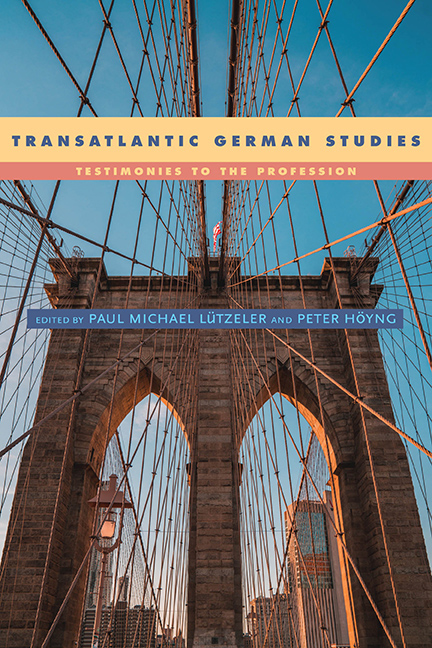Book contents
- Frontmatter
- Dedication
- Contents
- Acknowledgments
- Introduction
- From Erfahrungshunger to Realitätshunger: Futurity, Migration, and Difference
- In-between: The Participant as Observer—The Observer as Participant
- Transatlantic Space and My Own History of Globalization
- Deplazierte Personen: Why Would an American Become a Germanist?
- Metamorphoses and Meanderings of a Wanderer between Worlds
- German Studies as Vocation: My Path into It, Out of It, and Back into It
- My Long Way from Germanistik to Afro German Studies
- Mustang Red: My American Road to Critical Theory
- Third Place: How a French Germanist Became an Applied Linguist in America
- Transatlantic Exchanges: German Studies—European and American Style
- Being at Home in the Other: Thoughts and Tales from a Typically Atypical Germanist
- After Australia: Triangulating an Intellectual Journey
- A Tale in Translation: An Academic Itinerary from Istanbul to Bryn Mawr
- Beyond Passing: Transculturation in “Contact Zones”
- Far from Where? Germanistik between the Continents
- Epilogue: The Usefulness of Useless Studies
- Index
From Erfahrungshunger to Realitätshunger: Futurity, Migration, and Difference
Published online by Cambridge University Press: 14 February 2019
- Frontmatter
- Dedication
- Contents
- Acknowledgments
- Introduction
- From Erfahrungshunger to Realitätshunger: Futurity, Migration, and Difference
- In-between: The Participant as Observer—The Observer as Participant
- Transatlantic Space and My Own History of Globalization
- Deplazierte Personen: Why Would an American Become a Germanist?
- Metamorphoses and Meanderings of a Wanderer between Worlds
- German Studies as Vocation: My Path into It, Out of It, and Back into It
- My Long Way from Germanistik to Afro German Studies
- Mustang Red: My American Road to Critical Theory
- Third Place: How a French Germanist Became an Applied Linguist in America
- Transatlantic Exchanges: German Studies—European and American Style
- Being at Home in the Other: Thoughts and Tales from a Typically Atypical Germanist
- After Australia: Triangulating an Intellectual Journey
- A Tale in Translation: An Academic Itinerary from Istanbul to Bryn Mawr
- Beyond Passing: Transculturation in “Contact Zones”
- Far from Where? Germanistik between the Continents
- Epilogue: The Usefulness of Useless Studies
- Index
Summary
ANFANG UND FORTSCHRITT was the grammar book with which my German-language learning began in the New England fall of 1971, when I was nineteen and a sophomore in college. Yet there is nothing predictable about “beginning” or “progress” in my story of becoming a professor of German literary studies, and writing this in the summer of 2017, I cannot help but feel that any storytelling path I choose will be misguided, strewn with unfortunate omissions and isolated emphases, feigning more cohesion and surety than my personal trajectory warrants. This is an essay I never sought or knew how to write, so it has become an essay in the literal sense of the word. Theodor W. Adorno, who wrote so brilliantly in “The Essay as Form” in 1958, is a comfort to me when he insists (though comfort is hardly his concern) that the essay as form sets into motion a “force field” of utopian longing (13), “continuity as discontinuity” (16), and “individual human experience held together in hope and disillusionment” (8). Karl Marx once wrote in a related vein, in his sixth thesis on Feuerbach, that the “essence” of being human is not the property of individual human beings but “the ensemble of the social relations” (Engels, 97). This need not be confined to empirically existent relations, but where and how would I begin to draw meaningful lines of connection or distinction between my personal experiences and an “ensemble” story of transatlantic German Studies? This is a daunting and impossible task, and any attempt to undertake it will surely leave too many things unsaid. Yet the study of German language, literature, and culture that began for me in 1971 has taught me that the impossible can be worth pursuing, and that language can transform us all. German is a trickster, as I learned early on, when I discovered that a single word such as “bitte” could signal both need and grace, and that the magic of “Mensch” lies in this word's ability to mediate between the empirically imperfect and a humanist practice of becoming more than we took ourselves to be.
- Type
- Chapter
- Information
- Transatlantic German StudiesTestimonies to the Profession, pp. 5 - 22Publisher: Boydell & BrewerPrint publication year: 2018



